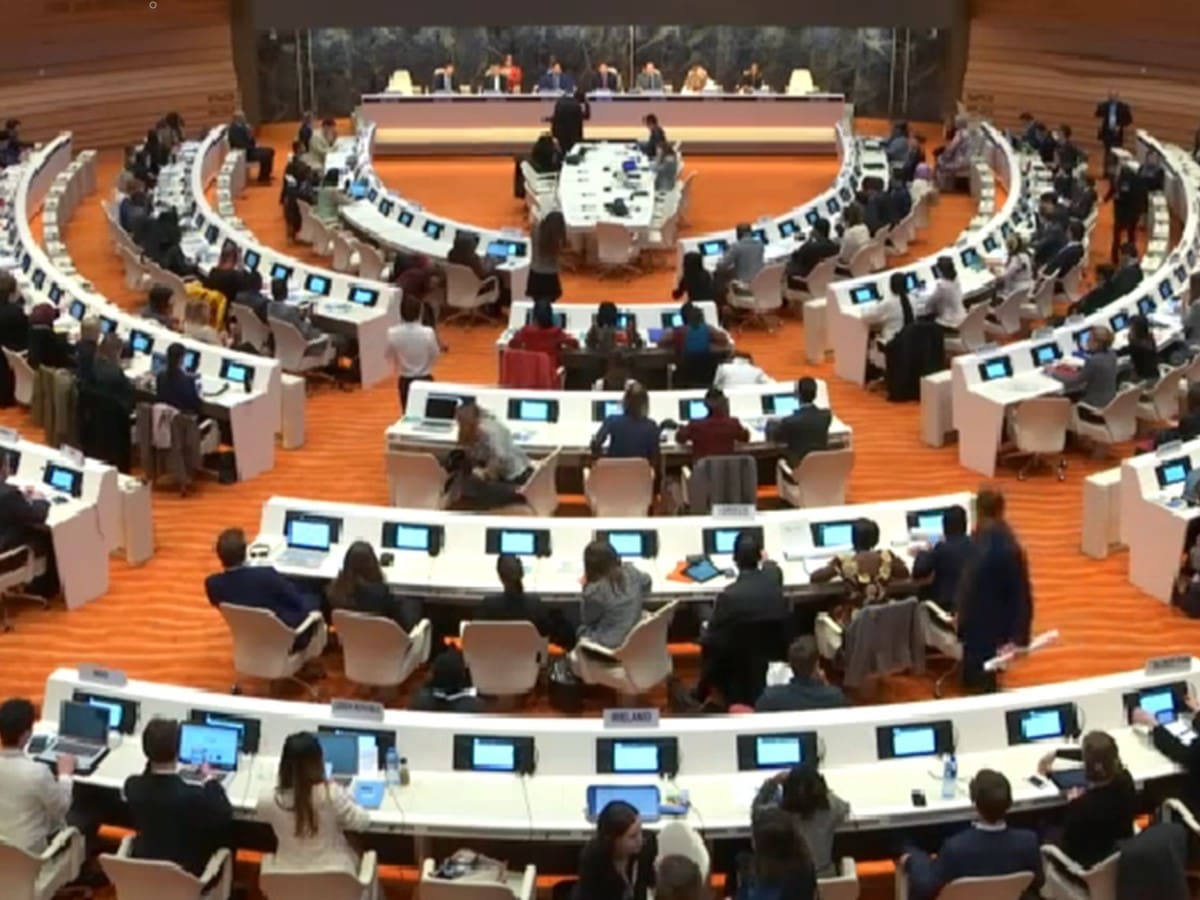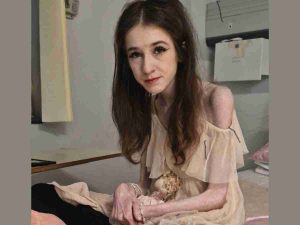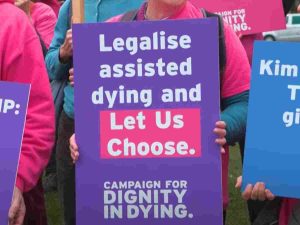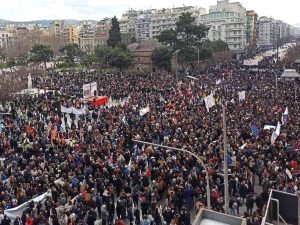It’s been two weeks since the UK government was hauled over the coals by the UN Committee on the Rights of Persons with Disabilities (UNCRPD) over their “grave violations” of the Convention on the Rights of Disabled People. Anyone who watched the hearing live online will know what went down. The government told a pack of lies then told some more to gloss over the deaths of disabled people when questioned.
It was frustrating for all disabled people to hear that the government – who’ve been not only failing them but actively endangering them – apparently think they’re, to borrow a phrase from Gillian Keegan, “doing a fucking great job”. However, it was even more infuriating for those of us in the room.
The UNCRPD in Geneva: an unexpected journey
To explain fully how I ended up at a hearing in the UNCRPD, let me take you back to the beginning of March. I was working on a story about the Disabled People Against Cuts (DPAC) ‘No More Benefit Deaths’ protests outside the DWP, so contacted one of the founders of DPAC Ellen Clifford for a quote.
However, I was quite shocked when as well as giving me a quote, Ellen casually asked me if I wanted to go to the UNCRPD with the Deaf and Disabled Peoples’ Organisations (DDPOs) delegation in a couple of weeks to watch the government finally answer for their treatment of us.
Ellen and I have worked together a couple of times, and I was one of the few reporters who got the story of how the government just plain refused to show up at the UNCRPD last August (when they were originally invited to give evidence at the same time as the DDPOs) into mainstream media.
At the time the government told me they had always intended to give evidence in March in the ultimate “oh no you misunderstood us – silly little disableds” gaslighting we’re all used to by now.
That sort of abject trauma of fighting for disability rights and screaming til our voices break I suppose bonds people. So, despite it being in less than two weeks’ time I instinctively knew I had to be there with the incredible bunch of people Ellen was telling me about.
A delegation of lived experience
The delegation included activists from DPAC, Inclusion London, Disability Wales, Disability Rights UK, Reclaiming our Futures Alliance, DPAC NI, and unions such as Unite, the Trades Union Congress (TUC), and Equity. I was quietly anxious to meet the families of deceased benefit claimants, some of whom I’d written or edited pieces about.
Two flights and later and I was touching down in Geneva on Sunday 17 March. The delegation was split around the city and although the hearing was on Monday 18 March and obviously the main reason we were there, it gave us an excuse to all come together and just be in each other’s company.
We spent Sunday coming up with our clear messages whilst also eating fondue, chatting on the beach, exploring the city, sharing resources, and finding comfort in other people who had our lived experience.
Then Monday afternoon came round all of a sudden and there I was walking up to one of the most famous buildings in the world.
Before the session the DDPO delegation got together to have lunch and discuss what we hoped would come from today. Although we weren’t allowed to speak it was important to the DDPOs that we got the message out there that we were here standing up for rights – even if the government wouldn’t speak to us.
The government whitewashing its record at the UNCRPD
I’ve been asked a lot how it felt to be in the room when the government told the UNCRPD that they pretended to be:
committed to upholding the Convention on the Rights of Disabled People.
The short answer is frustrating. The long answer is frustratingly exhausting with moments of incredulity that meant I guffawed so loudly I thought I was going to be asked to leave.
Basically, after refusing to attend a hearing session that DDPOs were at, the government attempted to make it sound like they cared at all about disabled people.
They bragged about policies that they’d been forced to commit to by campaign groups. They boasted about the Disability Action Plan and National Disability Strategy. This is despite the fact that the strategy was being challenged in the High Court by disabled activists and the action plan had been widely derided for offering no solutions to the real issues affecting us.
The temptation to scream almost became too much when Alexandra Gowlland (someone who is so obscure in the Disability Unit I had to Google her whilst she was speaking) claimed the government are “Committed to transforming the benefits system”.
Lie after lie
I almost definitely muttered “Are you fuck” under my breath when she continued that they are:
ensuring people can access the right support and have a better overall experience when applying for benefits.
I felt the bile rise up in my throat as she claimed that “disability hate crime is completely unacceptable” when you consider the disgusting rhetoric that the government ministers are spreading via the press; something I’ve fought hard against.
I was unsurprised to see that the focus was kept on SEND kids, something the government love to tug on people’s heart strings about. But what happens when we stop being cute disabled kiddies? They’re quick to paint us as burdens then.
The most “you what mate??” moment was when Gowlland repeated that the government “welcome this dialogue” which was news to all of us who they couldn’t even make eye contact with despite being sat a few rows away.
‘Dehumanising disabled people’
There was a moment of intense validation though when it came time for the UK Rapporteurs to grill the government.
The outstanding Rosemary Kayess and Laverne Jacobs used evidence the DDPOs had shared with them about our real-life experiences under this government. Kayess said the government had created a “pervasive framework that dehumanises disabled people”.
Jacobs in her questioning brought up disability benefits deaths that had occurred after benefits had been stopped. The government did not even reference disability deaths in passing in their response. This was especially insulting when incredible campaigners like Alison Turner, daughter in law of Errol Graham, were sat in the room.
After the hearing I felt drained. Standing outside with Alison whilst she smoked a cigarette, we both sobbed frustrated tears. After many of the DDPOs expressed disbelief at the governments lack of shame, with one member cracking the group up with “well that could’ve been an email!”
Despite how disappointing and embarrassing the government’s “evidence” was, this wasn’t a loss for disabled people in my opinion.
The UNCRPD showed the power of community
The main aim was to make a huge fuss on social media and more than anything ensure the disabled community knew there were people in their corner.
Being a disabled person can be isolating, even more so when the government and media are constantly belittling our rights and trying to make us scared to live our lives. The DDPO delegation showed disabled people at home that they’re not alone, to be part of that made me feel so empowered, surrounded by people who had mine and so many others backs.
There was never a single moment that didn’t feel huge and significant all weekend, from sitting on the beach discussing our lives and experiences to catching up over baba ghanoush. The trip felt serious sure, but it also felt joyous; significant to have this many disabled people not only fighting back but existing and thriving and loving our lives despite what the government threw at us.
The end of the trip was bookended the same way it began, with a big meal, this time also celebrating my birthday, which was on 19 March. When I was shocked, Ellen told me “It’s important we celebrate disabled people, there’s enough shit”.
The love and joy I felt from these incredible hardworking compassionate souls is something I will hold with me forever.
It’s this power in community that the government can never take away from us, no matter how hard they try.
Featured image via the UN




